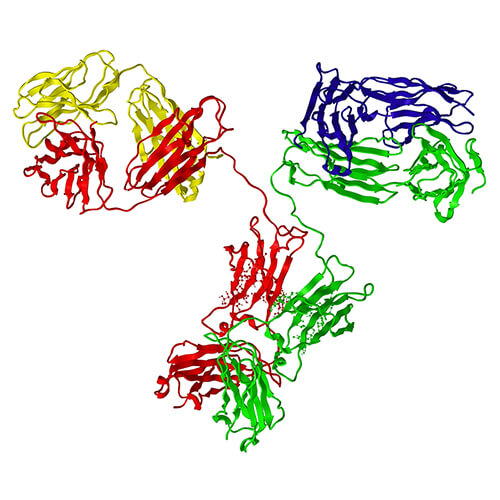Apolipoprotein A1 (ApoA1) is the protein fraction of high-density lipoproteins with anti-inflammatory and antioxidant properties that play a critical role in reversing cholesterol transport. The protein, as a component of HDL particles, enables the efflux of fat molecules by accepting fats from within cells (including macrophages within the walls of arteries which have become overloaded with ingested fats from oxidised LDL particles) for transport elsewhere, including back to LDL particles or to the liver for excretion. ApoA1 is often used as a biomarker for the prediction of cardiovascular diseases. Anti-human apolipoprotein A1 antibodies are used in indirect ELISA, for quantitation of the antigen in serum. They are also used for immunoprecipitation, immunohistochemistry, immunoturbidimetry, nephelometry assays and western blotting for highly sensitive qualitative analysis.
Anti-Human Apolipoprotein A1
Product Code : 00-ABD-MM-APA-001, 00-ABD-MM-APA-002
Available products:
| Product Name (New) | Product Code | Grade |
|---|---|---|
| Goat Anti-Human Apolipoprotein A1, Whole Serum | 00-ABD-MM-APA-001 | Whole Serum |
| Goat Anti-Human Apolipoprotein A1, Fractionated | 00-ABD-MM-APA-002 | Fractionated |
Specifications:
| Test Parameters | Acceptance Criteria |
|---|---|
| Product Code | 00-ABD-MM-APA-001 |
| Host | Goat |
| Immunogen | Human ApoA1 |
| Grade | Whole Serum |
| Physical Appearance | Straw to brownish yellow clear liquid without any suspended particles/Thin Tannish |
| Titre (Reverse Single Radial Immunodiffusion) | > 1 mg/ml |
| Shelf life | 3 years |
| Buffer details* | Tris saline with 15 mM NaN3, pH 7.2 ± 0.2 |
| Total Protein (Biuret method) | 50 to 150 mg/ml |
| Cholesterol (CHOD Enzymatic Method) | ≤ 50 mg/dl |
| Specificity (Immunoelectrophoresis) | Monospecific to human Apolipoprotein A1 when reacted with pooled human plasma & 2X normal human serum |
| Specificity (Ouchterlony) | Monospecific when reacted with normal human serum |
| pH | 7.0 to 8.0 |
| Storage conditions | 2 to 8 ºC |
| Test Parameters | Acceptance Criteria |
|---|---|
| Product Code | 00-ABD-MM-APA-002 |
| Host | Goat |
| Immunogen | Human ApoA1 |
| Grade | Fractionated |
| Physical Appearance | Clear to slight yellow liquid without any suspended particles |
| Titre (Reverse Single Radial Immunodiffusion) | > 1 mg/ml |
| Shelf life | 3 years |
| Buffer details* | Tris saline with 0.09% NaN3, pH 7.2 ± 0.2 |
| Total Protein (Biuret method) | 50 to 150 mg/ml |
| Cholesterol (CHOD Enzymatic Method) | ≤ 50 mg/dl |
| Specificity (Immunoelectrophoresis) | Monospecific to human Apolipoprotein A1 when reacted with pooled human plasma & 2X normal human serum |
| Specificity (Ouchterlony) | Monospecific when reacted with normal human serum |
| pH | 6.8 to 8.0 |
| Storage conditions | 2 to 8 ºC |
*Buffer composition can be customised as per the customer requirements. Product can be further customised as per the specific requirements.
For research use or further manufacturing purposes only
